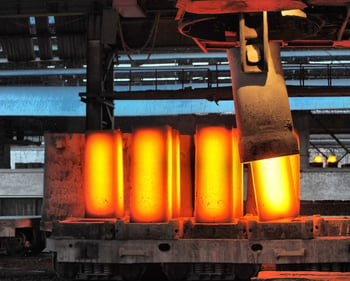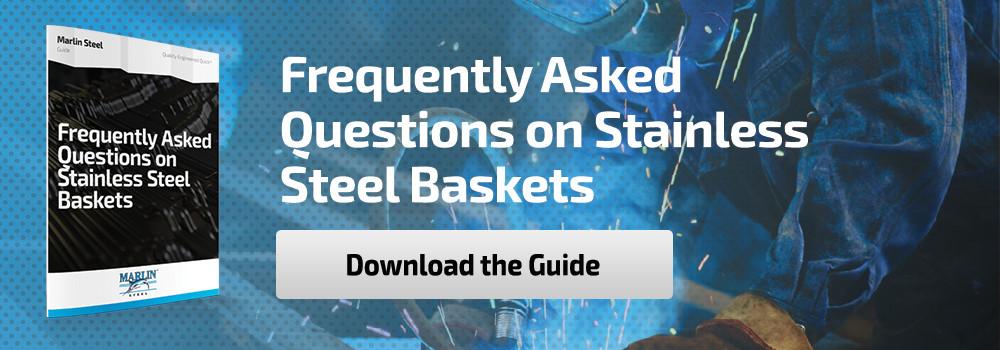 When most people think of metal, they think of a rigid, inflexible material that doesn’t change without great force being applied. What many people forget is that physical force isn’t the only kind of stress that metal will endure in many applications.
When most people think of metal, they think of a rigid, inflexible material that doesn’t change without great force being applied. What many people forget is that physical force isn’t the only kind of stress that metal will endure in many applications.
For example, a while ago, Marlin Steel got a call from a manufacturer who was having difficulty with their custom-fit material handling baskets. Their parts were going into the baskets easily enough, but after a high-temperature finishing process, they couldn’t get the parts out of the baskets.
The source of the problem was thermal expansion of metals used in the construction of the baskets.
What Thermal Expansion is
Thermal expansion is the tendency of some materials to expand when they heat up. As certain materials absorb thermal energy, their molecules enter an excited state. When the energy builds to a certain, individual molecules start to shift position and move away from each other—causing the material to expand.
For materials with a lower melting point, thermal expansion isn’t often an issue; such materials turn to liquid rather than expanding. However, many metals have a high enough melting point that expansion can be a serious problem.
Why Thermal Expansion is an Issue for Materials Handling
 In materials handling applications, it’s important to be as quick and efficient as possible. Thermal expansion is an issue because it can interfere with your ability to remove parts from custom-fit baskets.
In materials handling applications, it’s important to be as quick and efficient as possible. Thermal expansion is an issue because it can interfere with your ability to remove parts from custom-fit baskets.
For example, say that your custom fittings to hold your parts a total of 0.1” of free space. Any looser than that tenth of an inch, and the part might slip out. However, during a heat treatment process, the metal in the wires holding your parts in place expand slightly inwards, pressing tightly against the part.
Now, that 0.1” of room the part once had is gone, and it is actively being squeezed by the basket. In a best-case scenario, this makes the part hard to remove until the basket cools and the metal returns to its original size. On the other hand, the pressure from the expanded metal might damage the part. Worse, the basket’s custom fittings might permanently deform; making it nearly impossible to remove the part without damaging it.
In short, thermal expansion is a problem because it can make your production process less efficient, cause damage to your parts, or even render the basket useless.
Ways to Minimize the Impact of Thermal Expansion
There are several ways to deal with the issue of thermal expansion in a design, including:
- Changing the Basket’s Materials. One of the most common ways of dealing with thermal expansion is to switch to a material that can take the operating temperatures involved without experiencing significant expansion. However, this may not always be practical if the new material isn’t compatible with other aspects of the parts manufacturing process.
- Loosening the Hold On the Part. In manufacturing, it’s easy to become obsessed with holding a part in a very precise way. However, when planning a set of custom fittings for a part in a basket, it’s important to leave some room for the part to be inserted and removed easily. Loosening the hold that the basket has on the part can help reduce the impact of thermal expansion on ease of loading/unloading parts. However, it’s important to avoid making the basket’s grip on parts too loose.
- Completely Reworking How Parts Are Held. Another solution is to completely rework the basket’s design. Rather than using custom fittings, a set of individually-divided partitions with a lid might be used. This would allow quick access and eliminate thermal expansion as a factor for the parts by giving them plenty of extra room. However, this might not be ideal for processes where parts have to be held in a certain orientation to ensure a complete application of a coating or other special treatment.
The best solution might vary based on your particular parts and manufacturing processes, which is why it’s important for custom material handling basket makers to know the details of your process before manufacturing a basket for you.
Knowing in advance what specific stress factors are present in your manufacturing process (such as operating temperatures and chemicals used) can help companies like Marlin Steel improve the overall design of your material handling baskets and avoid issues such as thermal expansion making it hard to remove parts from baskets.
By taking into account the effect of thermal expansion and other stress factors when creating a custom wire basket design, it’s possible to ensure that your baskets will last longer and be more useful for improving your productivity.



.gif)


